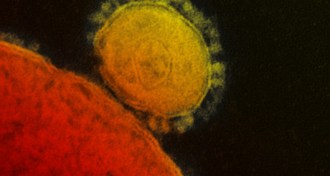Humans
Sign up for our newsletter
We summarize the week's scientific breakthroughs every Thursday.
-
 Health & Medicine
Health & MedicineH7N9 flu makes a comeback
Scientists warn that the risk that the illness could spread remains.
-
 Neuroscience
NeuroscienceFamous brain surgery patient H.M. retained a chunk of hippocampus
The patient's amnesia was probably due to the loss of other regions and neural connections.
-
 Life
LifeMolecule stops MERS spread among cultured human cells
The molecule interacts with the protein the MERS virus uses to enter a cell.
-
 Health & Medicine
Health & MedicineNanopackaging biodegrades after delivering cancer drug
DNA binding creates potentially nontoxic tumor-targeting structures.
By Beth Mole -
 Health & Medicine
Health & MedicineLow semen levels in mice make for fatter sons
Mice without the glands that make semen may sire sons with more body fat.
-
 Genetics
GeneticsStone Age Spaniard had blue eyes, dark skin
Genetics of 7,000-year-old skeleton suggests blond hair, pale skin came later.
-
 Health & Medicine
Health & MedicineAncient history of canine cancer decoded
A contagious cancer has been plaguing dogs for 11,000 years, a new genetic analysis reveals.
-
 Humans
HumansSmall fetal size early on might carry risks later
A smaller size in first trimester of pregnancy has been linked to heart-health warning signs in childhood.
By Nathan Seppa -
 Archaeology
ArchaeologyStone Age fishing spear found on Southeast Asian island
Notched piece of bone found near Indonesia illustrates surprisingly complex tool making 35,000 years ago.
By Bruce Bower -
 Archaeology
ArchaeologyAfter 2,000 years, Ptolemy’s war elephants are revealed
A genetic study sheds light on world’s only known battle between Asian and African elephants.
-
 Health & Medicine
Health & MedicineVaccine vindication
At least 103 million cases of childhood disease have been prevented by vaccines since 1924.
-
 Health & Medicine
Health & MedicineHow to read a book to your baby
To help your baby get the most out of story time, turn the story into a conversation, not a monologue.